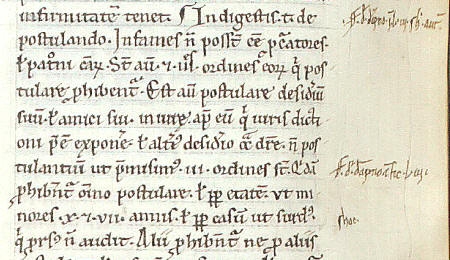|
Huguccio, Summa to C.3 q.7 c.2, Lons-le-Saunier, fol. 170va: "patroni," idest "aduocati." Hec uerba sunt Gratiani, set deinceps sunt uerba legis, licet Gratianus quandoque ea mutet uel sua interserit." ["patrons", that is "advocates." These are Gratian's words, but the following words are the words of the law, although Gratian sometimes changes them or inserts his own.] Gratian, Decretum K÷ln, Erzbisch÷fliche Di÷zesan- und Dombibliothek 128, fol. 111v |
In digestis tit. De postulando. [Digest 3.1] Infames non possunt esse procuratores uel patroni causarum. Sunt autem tres ordines eorum, qui postulare prohibentur. Est autem postulare desiderium suum uel amici sui in iure apud eum, qui iurisdictioni preest, exponere, uel alterius desiderio contradicere. Non postulantium, ut premisimus, tres ordines sunt. Quidam prohibentur omnino postulare uel propter etatem, ut minores decem et septem annis, uel propter casum, ut surdus, qui prorsus non audit. ["Infames" cannot be procurators or patrons of cases. There are three types who are prohibited from bring cases in court. To bring a case to court concerns he who wishes to bring his and a friend's case to court before the judge who exercises jurisdiction over him to explain or to contradict the accusation of another. There are three categories of people who cannot bring a case to a judge: because of their status, such as minors of 17 years or less, or on account of misfortune as a completely deaf person who cannot hear.] Gratian, C.3 q.7 d.p.c.1 |
